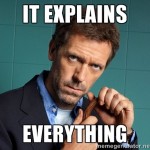There’s a blogging project started over at Patheos, “Why am I a …”, in which bloggers are supposed to respond in 200 words or less. Several Pagan bloggers have responded and their responses are worth checking out. I’ve written before about the things that I love about Paganism. But when I asked myself why I am (Neo-)Pagan, the answer that came immediately to mind was the words of Theodore Roszak talking about the Sixties Counterculture (the same Counterculture out of which Neo-Paganism emerged):
“I am at a loss to know where, besides [Neo-Paganism], the radical discontent and innovation can be found that might transform this disoriented civilization of ours into something a human being can identify as home. They are the matrix in which an alternative, but still excessively fragile future is taking shape. Granted that alternative comes dressed in a garish motley, its costume borrowed from many and exotic sources–from depth psychiatry, from the mellowed remnants of left-wing ideology, from the oriental religions, from Romantic ”Weltschmerz”, from anarchist social theory, from Dada and American Indian lore, and, I suppose, the perennial wisdom. Still it looks to me like all we have to hold against the final consolidation of a technocratic totalitarianism in which we shall find ourselves ingeniously adapted to an existence wholly estranged from everything that has ever made the life of man an interesting adventure.“
That’s 147 words and they’re not mine, but I am borrowing them. What Roszak hoped for the Counterculture, I hope for Paganism today.
Recently, Sam Webster has stirred up a ruckus in the blogosphere for insisting that Paganism and Christianity are incompatible. And while I have issues with his fundamentalism, there is one thing that I do agree with Webster about: Paganism represents a potential source of transformation of Western secular society. And this is Webster’s “Pagan Agenda”:
“We have the greatest capacity to change the Mind of the Human World to produce a sustainable future. In fact, I warrant that we Pagan People have arisen now to do exactly this. We come from the Shadow of our culture. We are the Occult, the Hidden in this culture, the dark fertile bits that got left behind and forgotten in the drive for modernity. Don’t the Jungians say that it is from the Shadow that all real change comes? That in the shadow the resources to make profound change dwell? For this culture, we the Pagani, suppressed, repressed, and discarded, written out of history, forgotten and accursed, we the Pagani, are the Shadow. And the repressed always returns.”
Webster calls this change the “Pagan Restoration”:
“Pagans are the shadow of western civilization. We are the rejected, the forgotten, and the repressed of our culture. Yet, while we are so burdened, this position also gives us a tremendous point of leverage to change our society, for as Jung taught, it is to the Shadow we must go when we are unable to find solutions in the face of challenge. Our human world is facing its greatest crisis yet. I believe this crisis is a necessary stage for humanity to achieve its adulthood, growing out of consuming everything around and soiling our bedding. The only solutions being presented perpetuate and do not solve the crisis. I believe that the Pagan way can contribute to a vision of a world that works, but only if we are taken seriously; and this requires Pagan Restoration.“
Whether it is a “restoration” or, as the Pagan Layman suggests, a “renaissance”, the point is: Webster wants Paganism to save the the world. And I feel the same.
How is this transformation of society to be accomplished? It begins with a change of consciousness. According to Roszak, “The building of a good society is not primarily a social, but a psychic task.” The Counterculture went “beyond ideology to the level of consciousness, seeking to transform our deepest sense of the self, the other, and the environment.” “The real meaning of revolution is not a change in management … but a change in man,” Roszak wrote. “Change the prevailing mode of consciousness and you change the world.” What is the change in consciousness I am talking about? It is the experience of what Ludwig Feuerback described as “the unity of religion and politics, of spirit and nature, of god and man.” It is the resacralization of nature, the re-enchantment of the world.
I have previously described Paganism as “a rich and complex tradition with the potential to transform consciousness and, dare I say, save the soul of the world.” And that is why I am Pagan.















